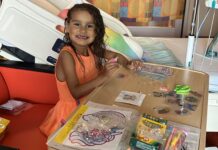
By Murray Siegel[quote_box_right]In 2018-19, Maricopa Unified School District had 231 students participating in a gifted program, an increase of more than 200% since the 2013-14 school year.[/quote_box_right]
We understand what a gifted pianist or a gifted painter or a gifted athlete is. In each case, they produce results that are far superior to others’ attempts at music, art or athletic endeavors. What does a gifted student produce?
Some say gifted students produce superior grades. During my 46 years of teaching, I have had the responsibility to teach in advanced, honors and Advanced Placement classes. I have seen students who were labeled “gifted” whose grades were lower than expected, and I had many students who did not qualify as gifted yet who produced consistently magnificent results on tests and projects.
So, what does it take to be gifted? Typically, this is based on IQ (intelligence quotient) where the mean (average) score is 100. A 10-year old with an IQ of 100 has a level of intelligence that matches the ability of a typical 10-year old. Most IQ tests have a standard deviation (a measure of variability) of 15, and scores are placed in brackets based on standard deviation. An IQ of 130 is generally used as the minimum IQ for a gifted program and is two standard deviations above the mean.
A 10-year old with an IQ of 130 has an intellectual level equivalent to an average 13-year old and approximately 2% of the population has an IQ of 130 or above. IQ measures potential, and some do not reach their potential while others exceed it.
To understand the gifted student, allow me to briefly provide examples of truly gifted students who I have taught. They each had an IQ greater than 145, with one in a thousand being in that class.
Jared entered fourth grade with a knowledge of logarithms. He sat in my university statistics class the next summer and received an A. He took calculus at Georgia Tech after fifth grade and excelled. Andrew was a student whose love was foreign language. As a Slavic linguist, he saw something that no scholar had ever seen; a pattern in Czech irregular verbs. Ben was a 10th grader in my AP calculus class and excelled in a class of the school’s brightest seniors. In 11th grade the school had no math class for him, so he took a differential equations class at a local college, to which the 15-year-old’s mother had to drive him.
Gifted students have the potential to cure cancer, slow climate change or write a transcendental piece of music. Parents and teachers must help gifted students realize their potential.
Murray Siegel, Ph.D., has 44 years of experience teaching mathematics. He is in his fifth year as a volunteer at Butterfield Elementary School.
This column appears in the December issue of InMaricopa.














![Carl’s Jr plans to “open soon” An exterior view of the new Carl's Jr. restaurant along John Wayne Parkway on May 7, 2024. [Elias Weiss]](https://www.inmaricopa.com/wp-content/uploads/2024/05/E1C66482-CB4C-4FD0-BA30-35CECE93F4BE-100x70.jpeg)

![Filiberto’s eyes building Maricopa restaurant An exterior view of a Filiberto's Mexican Food restaurant at an unknown location and date. [Jessica Boehm/Axios]](https://www.inmaricopa.com/wp-content/uploads/2024/05/axios-050724-filibertos-screenshot-e1715117410101-100x70.jpg)